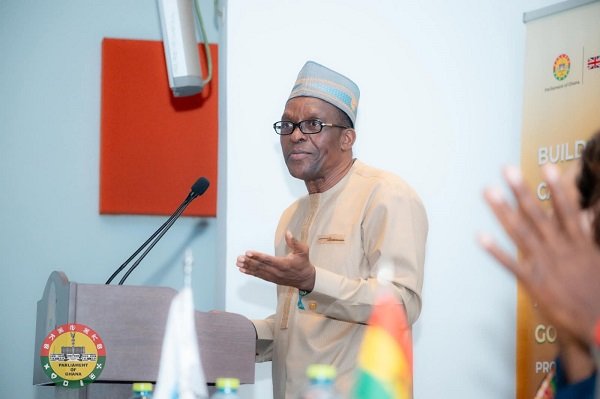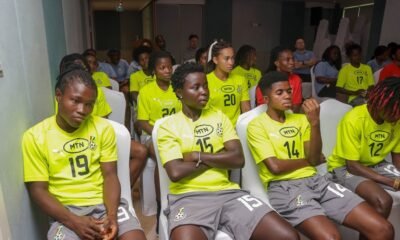News
Speaker of Parliament launches capacity building project in collaboration with World Bank and UK FCDO

The Parliament of Ghana took a significant step towards strengthening its legislative core as the Speaker, Alban Kingsford Sumana Bagbin officially launched a US$ 1,600.00 Million capacity-building project.
This initiative, developed through a partnership with the World Bank and the UK’s Foreign, Commonwealth and Development Office (FCDO), is designed to enhance the skills of Members of Parliament and their staff in areas of economic and financial governance.
At the launch, the Speaker expressed his gratitude to both organizations, emphasizing that this collaboration would reinforce Ghana’s democracy and support Parliament in fulfilling its constitutional mandate more effectively.
The project, entitled “Building the Capacity of Parliamentarians for Economic and Financial Governance,” was introduced by representatives from the World Bank and FCDO, who highlighted its importance in modernizing the legislative process.
The Speaker noted that the initiative would deepen existing partnerships between Ghana, the UK, and the international development community.
He underscored that a retooled Parliament would not only improve legislative efficiency but also help restore confidence in democratic governance and promote sound economic oversight.
In welcoming the project, the Clerk to Parliament, Mr. Ebenezer Ahumah Djietror outlined its potential to expand the engagement between Parliament and development partners.
He pointed out that by equipping Parliament with better tools and expertise, the institution would be more capable of discharging its legislative and oversight responsibilities benefiting the entire nation and its citizens.
Representatives from the UK, including Keith McMahon of FCDO and Ms. Michelle Keane of the World Bank, voiced the importance of continuous development in parliamentary procedures.
They emphasized that enhancing MPs’ understanding of legislative processes and financial management would foster greater accountability and transparency.
According to them, this would help combat corruption and ensure that public funds are managed prudently, aligning with Ghana’s sustainable development goals.
Leaders from both sides of the house, Mahama Ayariga and Alexander Afenyo-Markin, highlighted the importance of the initiative, describing it as both timely and impactful.
They called on committee leaders to assume full responsibility for the project and work steadfastly to ensure its successful rollout.
United in purpose, they expressed confidence that this effort would enhance Parliament’s efficiency and contribute significantly to Ghana’s broader development objectives.
News
Man sentenced to 25 years for robbery at Manso Akwasiso

A 30-year-old man has been sentenced to 25 years imprisonment with hard labour by the Bekwai Circuit Court for his role in a 2022 robbery at a mining site at Manso Akwasiso in the Ashanti South Region.
The convict, Dominic Ofori, also known as Fanta, was arrested on 16th February 2026 after years on the run. He pleaded guilty before the Bekwai Circuit Court to robbery contrary to Section 149 of the Criminal Offences Act, 1960 Act 29, and was accordingly sentenced to 25 years imprisonment with hard labour.
On March 20, 2022, the Manso Adubia District Police received intelligence that a group of armed men from Manso Abodom were planning to attack a mining site at Manso Akwasiso to rob the owner of gold concentrate. Acting on the information, police mounted a coordinated operation and laid an ambush at the site.
At about 5:30 pm the same day, four-armed men arrived at the site, fired indiscriminately, and robbed the miners of their gold concentrate. The police team on surveillance intervened, resulting in an exchange of gunfire.
Three of the suspects, Abu Abubakar, Musah Latif, and Gideon Takyi, sustained gunshot wounds and were pronounced dead on arrival at St Martins Catholic Hospital at Agroyesum. Dominic Ofori escaped at the time but was later arrested and put before the court.
The Ashanti South Regional Police Command has assured the public of its continued commitment to combating violent crimes and bringing offenders to justice.
News
Ashanti police arrest man for publishing false news on TikTok

The Ashanti Regional Police Command has arrested 45-year-old Isaac Boafo, also known as “Duabo King,” for allegedly publishing false news intended to cause fear and panic.
Police said the arrest follows a viral TikTok video in which Boafo claimed that four officers at the Central Police Station in Kumasi engaged in inappropriate conduct with commercial sex workers during night patrols in Asafo.
Officers from the Police Intelligence Directorate (Ashanti Region) apprehended Boafo after receiving intelligence about the video.
During questioning, he admitted to creating the video to attract views and engagement online, and acknowledged that he could not prove the allegations.
Boafo also admitted making comments about the President of the Republic for content purposes and could not defend those statements.
He has been formally charged and is in detention as investigations continue.
The Ashanti Regional Police have warned the public against publishing or sharing false information on social media, noting that such acts can cause fear, panic, and damage reputations.
They said anyone found engaging in similar conduct will face legal action.
By: Jacob Aggrey














